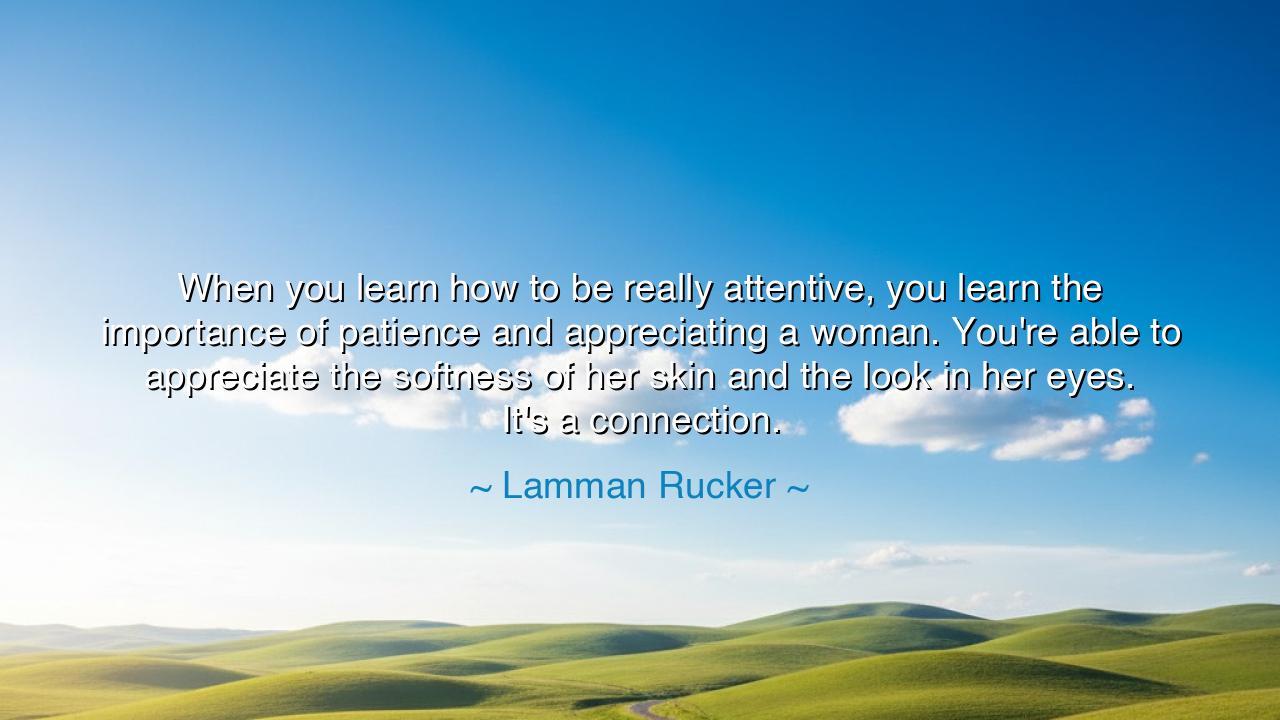
When you learn how to be really attentive, you learn the
When you learn how to be really attentive, you learn the importance of patience and appreciating a woman. You're able to appreciate the softness of her skin and the look in her eyes. It's a connection.






Hear the words of Lamman Rucker: “When you learn how to be really attentive, you learn the importance of patience and appreciating a woman. You’re able to appreciate the softness of her skin and the look in her eyes. It’s a connection.” In this saying lies not a fleeting sentiment, but a sacred teaching about love, presence, and the reverence due to another soul. For to be truly attentive is not to merely observe, but to enter into communion—to slow one’s spirit, to silence one’s haste, and to behold another human being in their fullness.
The ancients knew this truth well. In the poetry of Solomon, in the songs of Persia, in the verses of Sappho, one finds the same call: to notice, to linger, to let the heart be captured by the details others rush past. The softness of skin, the look in the eyes—these are not trivialities, but gateways to intimacy, signals that the soul is near. Rucker reminds us that the foundation of true love is not in conquest, nor in haste, but in patience, in dwelling long enough with another to let their presence shape you.
History gives us stories of such attentiveness. Consider the tale of Shah Jahan, who built the Taj Mahal in memory of his beloved Mumtaz Mahal. Though a ruler of vast dominions, what endured from his reign was not his power but his devotion—the way he saw her beauty, her spirit, her essence, so clearly that he carved it into stone. This act was not about fleeting passion, but about connection, the eternal honoring of another’s being. To be attentive is to see beyond flesh to soul, beyond appearance to essence.
Rucker’s words carry a rebuke to the age of haste. In a world where relationships are often rushed, where gestures are made without depth, and where the mind is distracted by countless things, the practice of attentiveness becomes rare. But when one chooses to slow down, to be present, to feel the warmth of another’s hand or the depth in their gaze, one discovers treasures that cannot be rushed. True intimacy cannot be microwaved; it must be simmered slowly, seasoned with patience.
Yet his teaching is not only for lovers—it is for all who would build meaningful relationships. For to be attentive is to honor the sacredness of every bond, whether between friends, family, or companions. To see another truly is to affirm their dignity, to remind them they are not invisible. The connection that arises from such attentiveness is the root of trust, the soil where loyalty grows, the bond that weathers storms. Without it, relationships remain shallow, easily broken; with it, they endure.
The lesson for us is clear: cultivate patience in your relationships, and train yourself in the art of attention. Do not be content with surface gestures, but lean into the details. Notice the tone in a loved one’s voice, the light in their eyes, the subtle changes in their spirit. Speak less, listen more. Touch with reverence, not haste. In doing so, you will discover the joy of truly appreciating another—not as an object, but as a miracle.
Practical wisdom follows. Each day, give those you love moments of undivided presence—set aside the distractions, silence the noise, and dwell with them fully. When impatience rises, breathe, and remind yourself that love’s richest harvest comes slowly. When you look upon another, see not only the form, but the soul within, and let your words and actions affirm that they are cherished. In this way, you will not only honor them, but also deepen your own spirit, for love given attentively is love returned in abundance.
Thus, let Lamman Rucker’s words be remembered as a teaching for generations: true intimacy is not forged in haste, but in patience, in reverent attention, in the willingness to see and to cherish. The connection that results is not a fleeting flame, but a steady fire, warming the hearts of both giver and receiver. And in this, we learn that to truly appreciate another is to touch the eternal.






AAdministratorAdministrator
Welcome, honored guests. Please leave a comment, we will respond soon